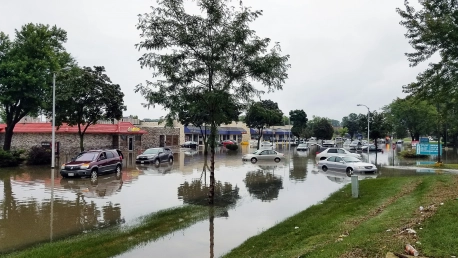In today’s rapidly evolving risk environment, natural disasters have emerged as the leading concern among professionals in the construction, property, and engineering sectors. These findings come from the reputable Allianz Risk Barometer report, which assimilated the insights of over 3,000 risk management professionals and business leaders from across the globe. Ranking highly among the slew of potential hazards that can affect these industries are catastrophic events such as hurricanes, earthquakes, and floods. Significantly detrimental to infrastructure, these disasters are notorious for causing unforeseen construction delays and upheavals in real estate markets, thereby interrupting industrial activities at large.
Catastrophic Events and Industry Impact
The looming threats of catastrophic events are resonating more than ever within the construction community, according to the Allianz Risk Barometer report. With almost two-fifths of respondents expressing concern, the focus on natural disasters, fires, and explosions reflects an acute awareness of their potential to inflict severe damage on projects and infrastructure. The repercussions of such destructive incidents ripple through the frameworks of businesses, causing not only physical damages but far-reaching economic implications as well. This highlights the need for comprehensive strategies to navigate the aftermath of these forces of nature and mitigate their impact on the engineering and construction industry.These calamities are not limited to the destruction of existing structures; they also pose significant harm to the lifelines of communities, including roads, bridges, and utility services, leading to extensive delays and cost overruns. It is these disruptions that often bring to light the intricate interdependencies within the real estate and broader industrial sectors. As projects are delayed and markets are unsettled, a domino effect is triggered, testament to the profound influence these events hold over the construction sector’s stability and prosperity.
Business Interruption and Continuity
As the survey unveiled, the specter of business interruption is a predominant concern for 28% of industry professionals. For the construction sector, operational readiness in the face of disaster is not an option but a necessity. The report emphasizes the critical nature of adopting innovative strategies and technologies for risk management and assessment. Diversification of project portfolios, paired with cutting-edge analytical tools, can help mitigate the risk of interruptions and sustain business continuity. Proactive measures in this domain are quintessential for fostering resilience against the unpredictable upheavals caused by natural disasters.Furthermore, the value of preventive planning becomes irreplaceably evident when considering the potential for long-term impediments to operational efficiency following disastrous events. Business processes can be severely disrupted, leading to compounded financial losses and immobilizing recovery efforts. Hence, deploying strategic risk management approaches and bolstering response plans constitutes the vanguard in maintaining continuity and limiting the duration of any interruptions. It’s imperative for businesses to integrate responsive adjustments and robust disaster recovery protocols into their operational frameworks.
Fire Prevention and Safety Measures
Amid heightened concerns over the prospect of fires and explosions, Allianz underscores the necessity of steadfast fire prevention strategies within the construction sector. Rigorous adherence to building standards and the integration of advanced detection systems are pivotal to maintaining a safe working and living environment. Collaboration with dedicated emergency responders is also crucial, ensuring a coordinated and efficient response in the event of a crisis. These precautions not only protect physical assets but are fundamental in the preservation of human life and the mitigation of property losses.Fire safety measures extend beyond mere compliance with regulations, branching into an organized effort encompassing risk assessments, employee training, and the active management of potential ignition sources. By integrating these into a holistic fire safety strategy, businesses fortify themselves against a pervasive threat that can instantaneously erode hours of meticulous labor and capital investment. Companies must remain ever-vigilant, embedding fire prevention into their cultural ethos and operational directives to safeguard against sudden and devastating infernos.
Addressing Macroeconomic and Cyber Risks
The scope of risk in the construction industry spans further to include complex macroeconomic developments and emerging cyber risks. Economic fluctuations, from inflationary pressures to interest rate volatility, directly affect project financing, the demand for services, and broader market stability. Allianz recommends keen vigilance and flexibility in the face of these macroeconomic shifts. Parallelly, the pertinence of robust cybersecurity protocols cannot be overstated in an era where data breaches and cyber incidents can wreak havoc on operational continuity and data integrity.Companies must stay nimble, cultivating an ability to adapt to economic trends while concurrently probing for growth opportunities. Protecting sensitive information is equally imperative, wherein embracing comprehensive cyber defenses like potent encryption and employee training form the cornerstone of digital security. Such a multifaceted risk landscape necessitates a harmonized approach to economic and cyber threats, advocating a protective stance to preserve the continuity and advancement of the construction sector’s digital and physical realms.
The Role of Proactive Risk Management
In the current climate of escalating risk potential, the Allianz Risk Barometer, a respected industry report, reveals that natural calamities are now a top concern for professionals in the construction, real estate, and engineering fields. This conclusion stems from the feedback of more than 3,000 experts in risk management from around the world. Amidst the myriad of risks these sectors face, cataclysmic occurrences like hurricanes, earthquakes, and floods stand out. These events are infamous for their capacity to severely impact infrastructure, leading to unplanned construction delays and market instability in the property sector. Consequently, such disasters pose a significant threat to the continuity of industry operations, emphasizing the need for robust risk mitigation strategies in these fields. Their prevalence raises the stakes for preparedness and adaptation in a world facing increasingly unpredictable environmental challenges.









